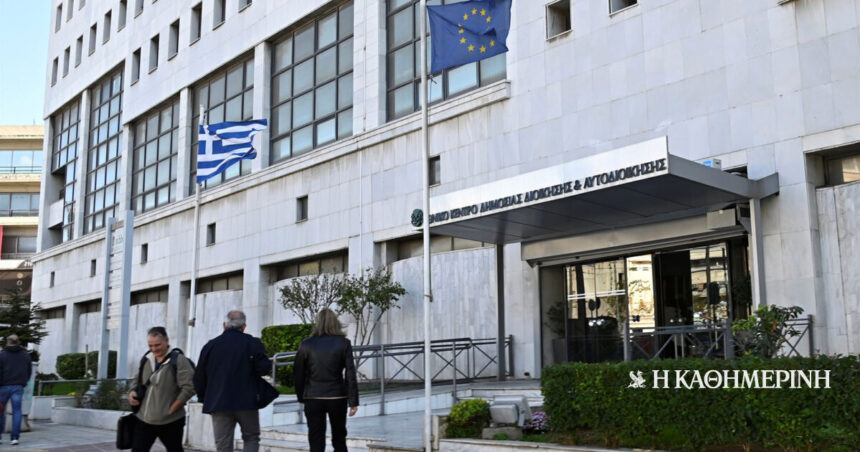Among the important legislative initiatives of 1983, it is worth mentioning the establishment of the National Center for Public Administration (EKDD, Law 1388/1983). The Center had a twofold basic mission: a) The initial training of civil servants, with the prospect of staffing the higher levels of administration. The meritocratic selection with the participation of the parties in the examination committee would allow there to be no political disputes. b) The continuous training of civil servants during their careers, through short-term programs. In this way, training actions were concentrated in a body that could form a strategic perception of the subject.
Reform that… survived
This initiative is important for several reasons. First, because it was an institutional reform that lasted a long time, since, with some inevitable changes over time, it now counts around four decades of operation. And this fact alone distinguishes it from others, which did not manage to take root. Secondly, because it was the starting point for a systematic effort to upgrade the administrative capacity, through the creation of high-level administrative officers and, in general, the development of human resources. And thirdly, because the very birth of the new institution symbolizes the – at first sight – paradox of the contradictory impulses that may characterize the exercise of policy by a government.
Especially with regard to the last point, it is recalled that other initiatives had preceded in the field of Public Administration: the reorganization of the ministries which led to the abolition of the General Directorates and the dismissal of the general directors (Law 1232/1982), the abolition of “multi-institution” (Law 1256/1982) and the reform of the system recruitment, with the introduction of an objective scoring system, which, however, emphasized criteria of the candidates’ social profile (Law 1320/1983). These examples formed the stigma of a different perception of administration and civil service, as confirmed by later changes.
These reforms followed the major change of government in 1981, when PASOK took over the government of the country. They were done in the name of the promised “change” and “democratization”, as a condition of “modernization”. Democratization referred to the elimination of the authoritarian mentality of the administration in its relationship with citizens, its opening to society and the access of wider social strata, especially the less privileged, to public service.
The values of equality and social justice were systematically mentioned in the introductory reports of the laws, which set as an explicit goal the fight against inequalities and injustices, avoiding the creation of privileged groups in the administration, etc. The interpretation and the way of transferring these values in the field of Public Administration resulted in the shrinking of the hierarchical pyramid (elimination of general directorates), although at the same time they signaled the mistrust of the new government towards the administration and its high-ranking officials. The same values were also invoked in the establishment of the “social criteria” for employment in the State, leaving the qualifications related to studies in the second place, while later interventions in the uniform grading scale and salary scale were also characterized by a particularly low degree of differentiation of the hierarchical ranks and the corresponding fees.
In such a context, the establishment of the EKDD and especially the National School of Public Administration contains elements of surprise.
Unstable balance
As can be seen in the introductory report of the law, this initiative attempted to balance between two contradictory trends: on the one hand, the dedifferentiation of the civil service, i.e. the softening of its classic characteristics (such as hierarchy and the related differentiation of hierarchical levels, roles, status and remuneration) and on the other hand the production of a special category of civil servants, with a high level of professional training. Its perspective was to staff the upper levels of the civil service and ultimately produce an “administrative elite”. This last element was part of the standard of the famous French National School of Administration (ENA), which was mainly followed (and in other matters) by the Greek initiative.
The stated objectives of Law 1388/1983 were democratization, modernization, impartiality and social representativeness. The first requires a “different professional culture and mentality”. For the second, an upgraded professional training provides the “objective conditions at the structural level” to support decision-making and implementation. Vocational training serves the third, impartiality: since civil servants are able “to carry out the policy of any government,” politics will have no reason “to change the administration from an organ of society and the state to an organ of a class or of the party”. Finally, social representativeness presupposes that “in the administration all members of society must have the right to enter and not exclusively or primarily persons belonging to a single social class or category”, which “can prevent the creation of private areas of power” , above the public, political power of the state”.
The strongly ideological character of the rationale behind the establishment of the EDRC, as well as other legislation of the period, perhaps results from the above: the EDRC “is not a simple technocratic innovation”.

At the same time, however, it is also clear that there is an attempt to address the weaknesses of the Greek administration, which were diagnosed more than two decades earlier, and to implement recommendations that had not been possible until then. For example, both report C. Marangkopoulou (1950) and the Langrod report (1964) had proposed the creation of a special category of managers with special training, and the Center Union government had adopted the idea of a productive school on the model of the French National School of Administration (ENA), without but to carry it out. In this context, it was a proposal for rationalization, depoliticization, and strengthening the professionalism and capacity of administrative officials. The issue returned with the PASOK government. At the same time, however, it bore the stamp of the governing party and its dominant perceptions and values.
In this mixture, one can also detect the contradictions mentioned above. The EKDD and especially the faculty will produce “executives for democracy”, depoliticizing their selection and placement, with a vision of a professionally adequate and upgraded administration. The differentiation of the status of this new category of executives in relation to the wider civil service could not, however, be particularly obvious: it contradicted the more general and rather dominant tendency to reduce differentiation (such as, for example, the collapse of the hierarchy, etc.) which referred to a certain conception of “social justice” and social representativeness. Thus, the concretization of the role, the career development and ultimately the status of the executives that the school would produce was referred to later decisions. At the same time, it was possible for civil servants who had graduated from secondary education, who made up the bulk of the employees, to enter the faculty, bypassing the requirement of a university degree. These examples give context to the resistance this initiative faced from the administration itself, resistances that led to its ineffective support in the following years.
Multiple reactions to a necessary initiative
And the opposition? The opposition of the N.D. he shared the need for such a school, that is, the major issue. However, as is often the case in the charged and conflictual climate of party confrontation, her disagreement on individual points led her to recommend voting against the bill as “unacceptable and dangerous for public administration”.
The issues raised concerned either the insufficient discussion of the bill with the stakeholders (civil servants, students of schools that were directed to the staffing of the administration, such as the Pantheon School) or the degree of control of the Minister of the Presidency over the procedures (e.g. .g. for the appointment of the members of the examination committee, despite the presence of party representatives).

There was also a confusion with the role of universities, although the faculty did not grant a degree, but also reactions to the decision to include – according to the French model – in the education of the faculty guidelines for the staffing of administrative courts (including the CoE) and the diplomatic corps. In these two cases, until then the competitions were “special”, i.e. they were organized outside the civil servant selection system. As one can imagine, the reactions to these two cases were significant, however, they seemed to be overpowered for the time being. But not for long, since a few years later they returned to the previous regime of “special” competitions.
Returning to today, despite individual criticisms, it is difficult to deny the contribution of EKDD(A) to the development of human resources. Continuous training is a crucial pillar of the permanent and dynamic adaptation of the Greek administration’s personnel to newer knowledge, skills and techniques, as well as to new demanding missions. Graduates of the National School of Public Administration now have careers spanning decades and can be assessed on their ability to support the increasing demands of management.
Overall, the legislative history marks yet another institutional initiative that succeeded, while contradicting other government policies in the same field and while being labeled “dangerous” by the opposition – although admittedly potentially useful and necessary.
*Mrs. Kalliopi Spanou is a professor of Administrative Science at the Department of Political Science and Public Administration of the National and Kapodistrian University of Athens.
*Editor: Evanthis Chatzivasiliou




